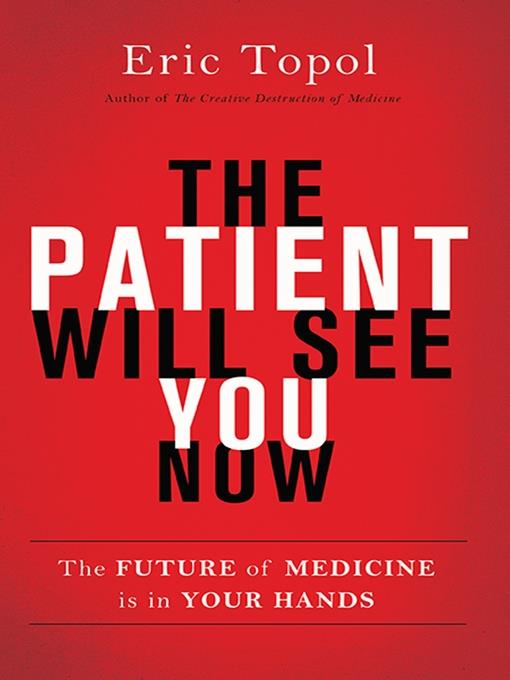
The Patient Will See You Now
The Future of Medicine is in Your Hands
آینده پزشکی در دستان شماست
کتاب های مرتبط
- اطلاعات
- نقد و بررسی
- دیدگاه کاربران
نقد و بررسی

January 5, 2015
Cardiologist Topol argues for taking down the boundaries separating the medical and digital worlds, boldly exploring how patients can shape the medicine of the future. He uses actress Angelina Jolie's prophylactic double mastectomy as an illustration of the power of the individual to change public perception about genetic testing and claiming that every patient now has the opportunity to have their "medical essence" available to them through their "little wireless devices." We are not there yet, but he maps out an ambitious path to hurry us along, calling for patients to be able to access their complete medical record as well as using current "digital strategies" for promoting adherence to all the medications one might be prescribed. The outpatient visit of the future will be equally revolutionized, Topol suggests, with "virtual visits" that he claims will not marginalize doctors and nurses, but rather make them more efficient. The digital age is already saving cancer victims' lives, he says, citing one project in which patients' clinical data and treatment is being shared by doctors to see what works best. Skeptics will have their guard up, though Topol enthusiastically declares that ours is a brave new digital world doctors and patients must fully embrace. Agent: Katinka Matson, Brockman Inc.

December 1, 2014
A visionary physician predicts a technology-driven, patient-centered revolution in health care.In this work about the changes afoot in the world of medical care, Topol, in this natural follow-up to his previous book (The Creative Destruction of Medicine: How the Digital Revolution Will Create Better Health Care, 2012, etc.), demonstrates the combination of intelligence and ambition that is apparent in his successful medical career: He's a top cardiologist, professor of genomics, director of Scripps Translational Science Institute and founder of the world's first cardiovascular gene bank at the Cleveland Clinic. Not content to simply critique the current system (though he does so thoroughly and convincingly), the author strides optimistically into the future of health care. In the very near future, he predicts, medicine will be patient-centered to a degree unimaginable to the countless readers who have lost countless hours in the waiting room. All of this will come courtesy of new technology that Topol likens to the introduction of the printing press, which revolutionized the dissemination of information. Medicine's "Gutenberg moment," writes the author, will similarly democratize medicine, enabling things like quick and accurate "smartphone physicals" and comprehensive individual genomic profiles with minimal input from the top-heavy, cost-intensive hospital system we now rely on. It's all good news for patients, although some of Topol's more complex statistical analyses and heavy use of medical terminology, particularly in genomics, might put off some lay readers. Others will relish the robust research the author presents throughout. Most will come away impressed with the body of knowledge Topol has collected here and, if they're not convinced that our health care fortunes are poised to change, they're at least hopeful that we are moving in the right direction. An expertly detailed, precisely documented exploration of the "power of information and individualization" in health care.
COPYRIGHT(2014) Kirkus Reviews, ALL RIGHTS RESERVED.

January 1, 2015
Cardiologist/professor of genomics Topol expands on his 2012 The Creative Destruction of Medicine, extending his vision of the role that new technology and genomics can play in the future of medicine. Exploring a personal GIS (a "Google map" of an individual's demographic, physiologic, anatomic, biologic, and environmental data), lab tests and scans by smartphones, electronic health records fully accessible to the patient, costs, and 24/7 medical consultations via mobile devices, the author foresees a "power shift" in which all people have the same access to care "provided they have a mobile signal." Therefore, a "renaissance of medicine" will enable patients to call the shots and make their own choices. The book notes actress Angelina Jolie's decision to have a double mastectomy after learning that she carried a gene often associated with breast cancer as an example of a person making her own medical decisions despite some disagreement. VERDICT With its many charts, graphs, and citations, this forward-thinking work will appeal to all educated health-care consumers.--Marcia G. Welsh, Dartmouth Coll. Lib., Hanover, NH
Copyright 2015 Library Journal, LLC Used with permission.

January 1, 2015
Cardiologist Topol plays Nostradamus and Archimedes as he forecasts and engineers a new chapter in medicine. The instrument of his medical revolution is the smartphone. Continuing his discussion of digitized and unplugged health care begun in The Creative Destruction of Medicine (2012), he bashes current medical paternalism and pleads for patient emancipation and democratization. Topol foresees a future medical world profoundly bolstered by wireless Internet, where each individual will have all their own medical data and the computing power to process it. The availability of health records, genomic information, telemedicine, and an expanded role of social networks should boost economical and efficient health care in the future. He envisions smartphones armed with biosensors, apps, and even a lab-on-a-chip instrument that are capable of performing a physical exam, obtaining an electrocardiogram, measuring vital signs, checking glucose levels, and determining oxygen saturation. Small ultrasound devices can already image the heart ( making the venerable stethoscope obsolete, according to Topol). All this unprecedented do-it-yourself technology is likened to having an MD in your pocketminus a real doctor's healing touch and concern.(Reprinted with permission of Booklist, copyright 2015, American Library Association.)

























دیدگاه کاربران